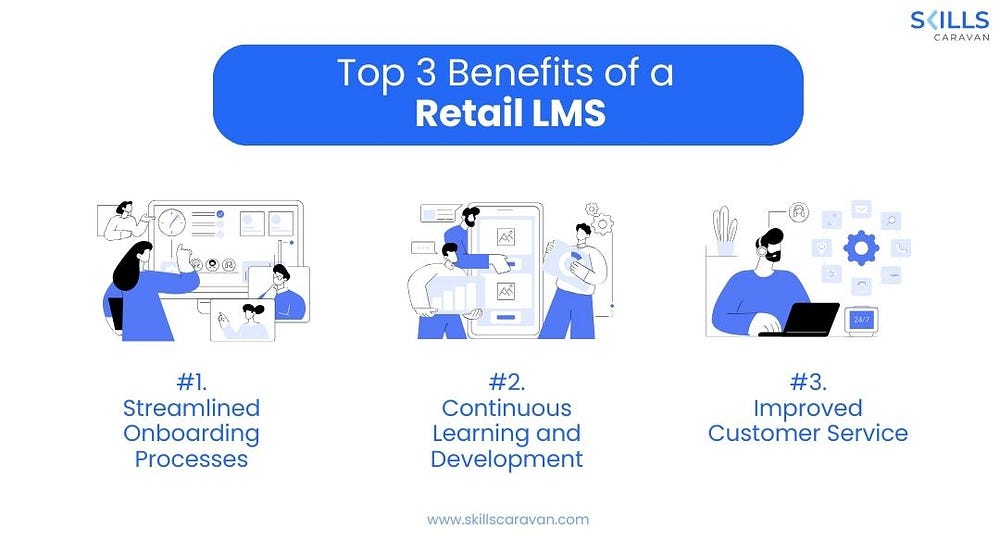Retail LMS: Why Top Retailers Are Investing in Digital Learning Platforms
In the fast-paced world of retail, employee knowledge and agility are critical to staying competitive. That’s why leading brands are increasingly turning to a Retail LMS (Learning Management System) to train, engage, and empower their teams. A Retail LMS isn’t just a tool; it’s a strategic investment transforming how retailers manage onboarding, product training, compliance, and customer service excellence.
Let’s explore why top retailers see digital learning platforms as a game-changer and how a Retail LMS is reshaping retail training across the globe.

What is a Retail LMS?
A Retail LMS is a digital platform specifically designed to deliver, track, and manage training for retail employees. Unlike generic learning systems, a Retail LMS often includes features tailored to the unique needs of retail businesses: multi-location training delivery, microlearning modules for busy sales teams, mobile access for on-the-floor training, and real-time performance tracking.
By using a Retail LMS, retailers ensure that every employee — whether in the corporate office, distribution center, or store floor — has access to consistent, up-to-date, and engaging training content.
The Changing Retail Landscape: Why Digital Learning Matters
The retail industry has been undergoing dramatic changes driven by digital transformation, evolving customer expectations, and shifting business models. In this environment, traditional training methods like classroom workshops or printed manuals fall short. Employees need immediate, flexible, and engaging learning experiences that keep up with the pace of change.
This is where a Retail LMS comes in. It brings training directly to employees’ smartphones or tablets, making learning part of their daily routine rather than an isolated event.
Key Reasons Top Retailers Invest in a Retail LMS
1. Faster, Consistent Onboarding Across Locations
Large retailers often face the challenge of training thousands of employees across multiple locations. A Retail LMS streamlines onboarding by delivering standardized training content to every new hire, regardless of location. This ensures consistency in brand messaging, operational procedures, and customer service standards.
With digital onboarding, employees become productive faster, reducing training costs and turnover.
2. Continuous Learning and Skill Development
Retail is dynamic: new product lines, seasonal campaigns, and evolving customer preferences require staff to keep learning. A Retail LMS enables retailers to launch new training modules quickly, keeping employees updated on products, promotions, and compliance requirements.
Microlearning — short, targeted lessons — fits seamlessly into retail employees’ busy schedules, keeping them engaged without pulling them away from the shop floor for long periods.
3. Mobile-First Learning Experience
Today’s retail workforce is often young, digital-native, and mobile-first. A modern Retail LMS offers mobile-friendly content, allowing employees to learn anywhere — during quiet store hours, on breaks, or while commuting.
This flexibility increases course completion rates and improves retention, as employees can learn at their own pace in ways that suit their daily routines.
4. Data-Driven Training Decisions
A Retail LMS offers rich analytics and reporting tools that give managers insight into training completion rates, assessment scores, and skill gaps. Retail leaders can use this data to refine training programs, address underperformance proactively, and align learning strategies with business goals.
For example, if data shows lower sales in a specific product category, retailers can quickly launch refresher training on product knowledge and selling techniques.
5. Improving Customer Experience
Retail success is ultimately about delivering great customer experiences. Well-trained employees are more confident, knowledgeable, and better equipped to meet customer needs. A Retail LMS empowers staff to learn about product features, brand stories, and upselling strategies, translating directly into higher customer satisfaction and loyalty.
6. Cost-Effective and Scalable Training
Traditional training involves travel, printed materials, and instructor costs, which add up — especially for large retail chains. A Retail LMS significantly reduces these expenses by centralizing content and delivering it digitally.
Moreover, as the retailer grows — whether by opening new stores or hiring seasonal staff — a Retail LMS scales effortlessly without additional logistical challenges.
Features That Make a Retail LMS Effective
To truly unlock these benefits, a Retail LMS should offer:
- User-friendly interface: Easy navigation encourages adoption among non-technical staff.
- Mobile compatibility: Ensures learning is accessible on smartphones and tablets.
- Gamification: Features like badges, leaderboards, and points boost engagement.
- Personalized learning paths: Tailor content to roles such as cashiers, store managers, or merchandisers.
- Compliance tracking: Automate reminders and record-keeping for required certifications.
- Integration capabilities: Sync with HR and POS systems for seamless data flow.
Real-World Impact: Success Stories
Global retailers like Walmart, Sephora, and H&M use a Retail LMS to train thousands of employees worldwide. Walmart, for instance, introduced mobile learning tools to onboard seasonal workers quickly and effectively. Sephora leverages its LMS for product training and sales skills, ensuring beauty advisors deliver consistent, high-quality service across all locations.
These real-world examples highlight how investing in a Retail LMS isn’t just about training — it’s about building a smarter, more agile, and customer-focused retail organization.
Future Trends in Retail Learning
Looking ahead, the evolution of Retail LMS platforms will be shaped by:
- AI-driven personalization: Delivering content tailored to each employee’s learning style and career path.
- Social learning: Enabling employees to share best practices and learn collaboratively.
- AR and VR training: Providing immersive experiences for product demos and safety training.
- Real-time performance support: Quick reference tools to help employees answer customer questions instantly.
These innovations promise to make retail training even more engaging and impactful.
Conclusion: Investing in a Retail LMS is Investing in Success
In today’s competitive retail environment, investing in a Retail LMS is no longer optional — it’s essential. It helps retailers onboard employees faster, reduce turnover, improve sales performance, and deliver exceptional customer experiences.
For forward-thinking retailers, a Retail LMS is more than a training tool; it’s a strategic investment in people, growth, and long-term success.

Comments
Post a Comment